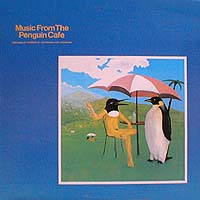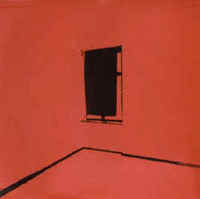14 November 02005
Discovering new music: rationality and randomness
Do you behave completely rationally when you buy music? These days it's a lot easier to base your purchases on sound evidence (pun unintentional). You can Google an artist you've heard of, check out their reviews in the press; read about their development and discography on All Music Guide or Wikipedia; see if there are any freely available MP3s or streams on the artist's own site or on Epitonic; or, failing that, listen to 30-second samples on the iTunes Music Store or Amazon. If you haven't got a particular artist in mind, you can listen to Last.FM or Pandora for a bit and hear the music that people who share some of your tastes like, or you can just ask them on your favourite fan chat forum. There's really no excuse for not being fully genned-up before you splash your cash.
But do you sometimes like to let a little randomness into your life? Is there anything you've bought that was based on some looser intuition about what might appeal from you, or what might broaden your horizons beyond what you normally listen to? Do you even buy music on the basis of a good track title, or the singer's haircut? If you've got any good anecdotes to share, please send them to me, as I'm collecting little stories that illustrate different ways of discovering new music.
Meanwhile, here are a couple of stories of my own, going back to the days before everything you needed to know was available on demand.
Twenty five years ago, I'd see records in the bigger stores by artists that were never played on the radio and I didn't see them mentioned or advertised in the press. I was curious: who bought these records? Did people just find out about them from friends? With hindsight, I think it was boredom that drove my curiosity; boredom and too much time on my hands — the curses of the teenager. I loved my record collection, but it was modest and soon became over-familiar. I spent a lot of time in record shops, the same shops, week after week, poring over the same set of records in the same racks. Sooner or later I was bound to take a gamble.
Under the Ps there were a couple of records by the Penguin Cafe Orchestra.  An intriguing name for a band, if that's what they were, and their track titles — Pythagoras's Trousers, The Sound of Someone You Love Who's Going Away and It Doesn't Matter — were beguilingly eccentric. Most striking of all were the covers of the albums: Emily Young's paintings of penguin-headed humanoids striking curious poses. I can't remember if I noticed that the records were on the EG record label, or how much that might have meant to me if I did, though I already had albums by Robert Fripp on EG by that time. Anyway I took a chance on Music from the Penguin Cafe, the Orchestra's first album (pictured right), and more than two decades later I have just about everything they ever recorded (the Orchestra came to a premature end when its leader, Simon Jeffes, was struck by a fatal brain tumour in 01997).
An intriguing name for a band, if that's what they were, and their track titles — Pythagoras's Trousers, The Sound of Someone You Love Who's Going Away and It Doesn't Matter — were beguilingly eccentric. Most striking of all were the covers of the albums: Emily Young's paintings of penguin-headed humanoids striking curious poses. I can't remember if I noticed that the records were on the EG record label, or how much that might have meant to me if I did, though I already had albums by Robert Fripp on EG by that time. Anyway I took a chance on Music from the Penguin Cafe, the Orchestra's first album (pictured right), and more than two decades later I have just about everything they ever recorded (the Orchestra came to a premature end when its leader, Simon Jeffes, was struck by a fatal brain tumour in 01997).
These risks didn't always pay off quite so smoothly. There was a record shop in Guildford that had a good collection of German electronic music in the period after Krautrock and Kraftwerk were at their peak but before electronica really took off. The ersatz lavender whiff of New Age was not too far away. I already had several Tangerine Dream and Klaus Schulze albums in my collection, and had branched out into other releases on Schulze's Innovative Communications (IC) label.
Buoyed by the 'winning streak' of taking a punt on Schulze himself and then IC's Robert Schroeder, I wanted to keep going. But I was running out of leads: Schulze had been in Tangerine Dream; Schroeder was on Schulze's label; after more or less exhausting these paths, the only 'cue' left was the proximity of unheard-of records to those I already knew in the Guildford shop's electronic section. Atmosphere by Adelbert von Deyen turned out to be the not-so-thin end of the New Age wedge — just bland and noodly — and I don't think I've listened to it at all in the last twenty years (von Deyen is now working as a painter, and his pictures have a similar quality to how I remember his music).
 Conrad Schnitzler, however, was a different matter. He looked to have some things in his favour: he was very briefly a member of Tangerine Dream and the cover of his Conal album was fantastic (see right; its stark minimalism is much more striking when 12 inches square). When it was still there on about my fourth visit to the shop, I bought it. And for a long time, I considered this the most unlistenable thing I'd ever heard. I used to get it out every now and again to check that I still didn't like it, but, even if I just had it on as background music, I'd take it off before it got to the end of a side. Then several years later, I went to dig it out and try it again, and found next to it a second Schnitzler album, Control. I never could remember how or when I'd come to own this other album. Its presence in my collection paints me as one of those wilfully perverse people who thinks something interesting must be going on if someone really hates a piece of music — even if that someone is me.
Conrad Schnitzler, however, was a different matter. He looked to have some things in his favour: he was very briefly a member of Tangerine Dream and the cover of his Conal album was fantastic (see right; its stark minimalism is much more striking when 12 inches square). When it was still there on about my fourth visit to the shop, I bought it. And for a long time, I considered this the most unlistenable thing I'd ever heard. I used to get it out every now and again to check that I still didn't like it, but, even if I just had it on as background music, I'd take it off before it got to the end of a side. Then several years later, I went to dig it out and try it again, and found next to it a second Schnitzler album, Control. I never could remember how or when I'd come to own this other album. Its presence in my collection paints me as one of those wilfully perverse people who thinks something interesting must be going on if someone really hates a piece of music — even if that someone is me.
Those Schnitzler albums never got much play. But even there, there is a silver lining. The records are apparently now highly collectable. A search on the web yesterday found Conal and Control for sale at between $50 and $100. My copies are mint condition — but they're not for sale. Four years ago, I was ordering some Flare and Moth Wranglers CDs from Mother West. I noticed they had a new release Conal 2001 by Conrad Schnitzler, so of course I had to add it to my shopping basket. I quite like it!
Posted by David Jennings in section(s) Cultural Calendar, Future of Music on 14 November 02005 | TrackBack
Subscribe to my RSS feed, which covers this blog, my book blog, and further commentary on other web resources (more feeds below)
Notes on Emergent Learning
School it Yourself: Review of The Edupunks' Guide and How to Set Up a Free School
What's holding Open Access publishing back?
On ecosystems, Adam Curtis and positions of power
The Whys and Wherefores of Creativity and Sharing: Review of Making is Connecting
Round-up of recent writing in other places
Purpos/ed: What's the purpose of education
Open, trusting, generous: review of Monkeys With Typewriters, a book on leadership
Do we need an agile learning community of practice?
Unplugged! The Agile Learning newspaper
Can we make a newspaper about self-organised learning?
Tony Hall on teaching by not teaching
Ollie Nørsterud Gardener: an entrepreneur's vision of peer-to-peer learning in organisations
Resilience and scaling down in the face of decline (Dougald Hine discussion, part 2)
Cinema (24)
Cultural Calendar (86)
Curatorial (66)
E-learning (102)
Events (35)
Future of Music (95)
Human-Computer Interaction (62)
Ideas and Essays (37)
Long Now (18)
Miscellany (44)
Music and Multimedia (157)
Playlists (27)
Podcasting (12)
Politics (12)
Radio (48)
Reviews (58)
Social Software (60)
Teaching (23)
Alternatively, see the Date-based Archives
Recommended: RSS feed that combines items on this site, my book blog, and commentary on other web resources
RSS feed for this site only
RSS feed for my book, Net, Blogs and Rock'n'Roll
RSS feed for shared bookmarks
My latest bookmarks (click 'read more' for commentary):
My archived bookmarks (02004-02008)
On most social sites I am either 'davidjennings' or 'djalchemi', for example: Flickr, Last.fm, Ma.gnolia and so on…
Lateral Action — managing creativity
Herd — social cognition
Seb Schmoller's e-learning mailings
Viridian Design Movement
Tom Phillips — artist
Long Now blog — resources for long-term thinking
Longplayer live stream — 1,000-year composition

The contents of this site are licensed under a Creative Commons Licence except where otherwise notified.
Hosted by Paul Makepeace
W3C Standards
Check whether this page is valid XHTML 1.0
Check whether the CSS (style sheet) is valid

